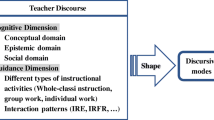Abstract
In this study, an instructional design model, based on the computational experiment approach, was employed in order to explore the effects of the formative assessment strategies and scientific abilities rubrics on students’ engagement in the development of inquiry-based pedagogical scenario. In the following study, rubrics were used during the model development, based on prompts provided to students during the development of their models. Our results indicate that modelling is a process that needs sequencing and instructional support, in the form of rubrics, focused on the scientific abilities needed for the inquiry process. In this research, eighty (80) prospective primary school teachers participated, and the results of the research indicate that the development of inquiry-based scenario is strongly affected by the scientific abilities rubrics.


Similar content being viewed by others
References
Angeli C (2005) Transforming a teacher education method course through technology: effects on preservice teachers’ technology competency. Comput Educ 45:383–398
Assay LD, Orgill MK (2010) Analysis of essential features of inquiry found in articles published in The Science Teacher, 1998–2007. J Sci Teach Educ 21:57–79
Bell PL, Hoadley C, Linn MC (2004) Design-based research as educational inquiry. In: Linn MC, Davis EA, Bell PL (eds) Internet environments for science education. Lawrence Erlbaum Associates, Mahwah
Bell T, Urhahne D, Schanze S, Ploetzner R (2010) Collaborative inquiry learning: models, tools and challenges. Int J Sci Educ 32(3):349–377
Brush T, Glazewski K, Rutowski K, Berg K, Stromfors C, Van-Nest MH, Stock L, Sutton J (2003) Integrating technology in a field-based teacher training program: the PT3@ASU Project. Educ Tech Res Dev 51(1):57–72
Bybee RW, Trowbridge LW, Powell JC (2008) Teaching secondary school science: Strategies for developing scientific literacy. Merrill, New Jersey
Chew S (2011) The importance of metacognition. Resource document. http://smgworld.bu.edu/edtech/2012/10/23/the-importance-of-metacognition/. Accessed 15 May 2013
Chittleborough G, Treagust D (2007) The modelling ability of non-major chemistry students and their understanding of the sub-microscopic level. Chem Educ Res Pract 8(3):274–292
Etkina E, Heuvelen A, White-Brahmia S, Brookes D, Gentile M, Murthy S, Rosengrant D, Warren A (2006) Scientific abilities and their assessment. Phys Rev Spe Topics- Phys Educ Res 2(2):020103
Gilbert JK, Boulter CJ, Elmer R (2000) Positioning models in science education and in design and technology education. In: Gilbert JK, Boulter CJ (eds) Developing models in science education. Kluwer, Dordrecht, pp 3–17
Grosslight L, Unger C, Jay E, Smith C (1991) Understanding models and their use in science: conceptions of middle and high school students and experts. J Res Sci Teach 28:799–822
Harms U, Mayer RE, Hammann M, Bayrhuber H, Kattmann U (2004) Kerncurriculum und Standards für den Biologieunterricht in der gymnasialen Oberstufe [Core curriculum and standards for biology at the gymnasium secondary level II]. In: Tenorth H-E (ed) Kerncurriculum Oberstufe II. Biologie, Chemie, Physik, Geschichte, Politik. Beltz, Weinheim, pp 22–84
Hestenes D (1987) Toward a modelling theory of physics instruction. Am J Phys 55(5):440–454
Hestenes D (1999) The scientific method. Am J Phys 67:273–276
Jonassen DH, Strobel J, Gottdenker J (2005) Model building for conceptual change. Interact Learn Environ 13(1–2):15–37
Justi RS, Gilbert JK (2002) Models and modelling in chemical education. In: Gilbert J, De Jong O, Justi R, Treagust DF, Van Driel JH (eds) Chemical education: towards research-based practice. Kluwer, Dordrecht, pp 213–234
Klahr D, Dunbar K (1998) Dual space search during scientific reasoning. Cogn Sci 12:1–48
Landau RH, Pαez J, Bordeianu C (2008) A survey of computational physics introductory computational science. Princeton University Press, New Jersey
Levy P, Little S, McKinney P, Nibbs A, Wood J (2010) The Sheffield companion to inquiry-based learning. Centre for Inquiry-based Learning in the Arts and Social Sciences, The University of Sheffield, Sheffield
Ling L, Fulmer G, Majerich D, Clevenstine R, Howanski R (2012) The effects of a model-based physics curriculum program with a physics first approach: a causal-comparative study. J Sci Educ Technol 21:114–124. doi:10.1007/s10956-011-9287-2
Minner D, Levy AJ, Century J (2010) Inquiry-based science instruction—What is it and does it matter: results from a research synthesis years 1984 to 2002 [Science Education]. J Res Sci Teach 47(4):474–496
Psycharis S (2011) The computational experiment and its effects on approach to learning and beliefs on physics. Comput Educ 56:547–555 (i.f 2,868)
Psycharis S (2013) The effect of the computational models on learning performance, scientific reasoning, epistemic beliefs and argumentation. Comput Educ 68:253–265. doi:10.1016/j.compedu.2013.05.015
Quintana C, Fretz E, Krajcik J, Soloway E (2000) Assessment Strategies for Learner-Centered Software. In: Fishman B, O’Connor-Divelbiss S (eds) Fourth international conference of the learning sciences. Erlbaum, Mahwah, pp 254–255
Rocard M (2007) Science education now; a renewed pedagogy for the future of Europe. Resource document. http://ec.europa.eu/research/science-society/document_library/pdf_06/report-rocard-on-science-education_en.pdf
Sadler D (1989) Formative assessment and the design of instructional systems. Instr Sci 18:119–144
Schmidt WH, McKnight CC, Raizen SA (1997) A splintered vision: an investigation of US science and mathematics education. Kluwer, Dordrecht
Treagust DF, Chittleborough GD, Mamiala TL (2004) Students’ understanding of the descriptive and predictive nature of teaching models in organic chemistry. Res Sci Educ 34:1–20
Tregidgo D, Ratcliffe M (2000) The use of modelling for improving pupils’ learning about cells. Sch Sci Rev 81:53–59
Vojta T (2006) An interactive approach to teaching computational physics. Research Corporation, Cottrell Scholar Conference, July 7, 2006. http://web.mst.edu/~vojtat/teaching/cottrell.pdf. Retrieved, May 12, 2013
Windschitl M (2004) Folk theories of ‘inquiry’: how preservice teachers reproduce the discourse and practices of an atheoretical scientific method. J Res Sci Teach 41(5):481–512
Xie C, Tinker R, Tinker B, Pallant A, Damelin D, Berenfeld B (2011) Computational experiments for science education. Science 332:1516–1517
Author information
Authors and Affiliations
Corresponding author
Rights and permissions
About this article
Cite this article
Psycharis, S. The Impact of Computational Experiment and Formative Assessment in Inquiry-Based Teaching and Learning Approach in STEM Education. J Sci Educ Technol 25, 316–326 (2016). https://doi.org/10.1007/s10956-015-9595-z
Published:
Issue Date:
DOI: https://doi.org/10.1007/s10956-015-9595-z




